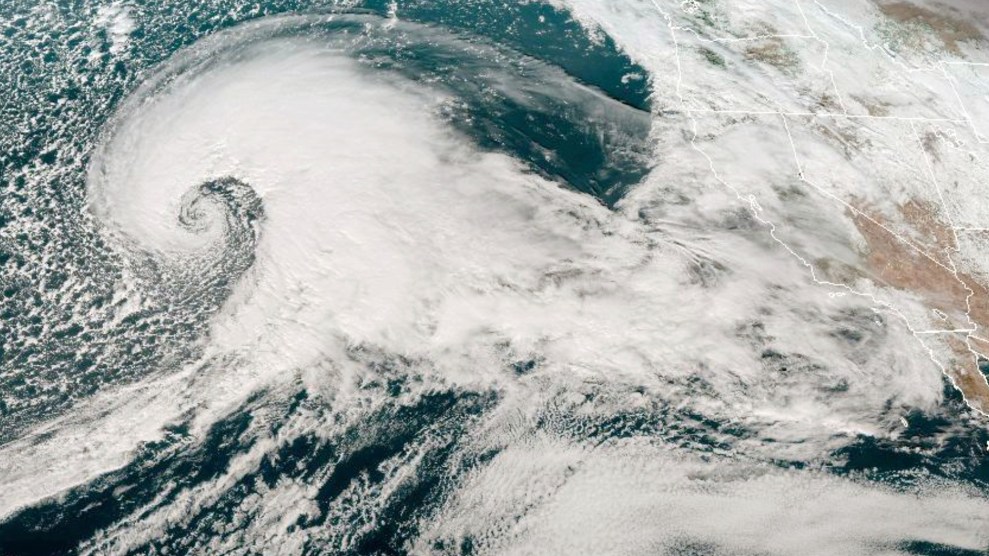
Average global surface temperatures over the past 12 months were 1.58 degrees Celsius above pre-industrial levels, exceeding the Paris agreement target.Edd Castro / ZUMA
This story was originally published by the Guardian and is reproduced here as part of the Climate Desk collaboration.
Another month, another global heat record that has left climate scientists scratching their heads and hoping this is an El Niño-related hangover rather than a symptom of worse-than-expected planetary health.
Global surface temperatures in March were 0.1 degrees Celsius higher than the previous record for the month, set in 2016, and 1.68C higher than the pre-industrial average, according to data released on Tuesday by the Copernicus Climate Change Service.
This is the 10th consecutive monthly record in a warming phase that has shattered all previous records. Over the past 12 months, average global temperatures have been 1.58 degrees Celsius above pre-industrial levels.
This, at least temporarily, exceeds the 1.5 degrees Celsius benchmark set as a target in the Paris climate agreement but that landmark deal will not be considered breached unless this trend continues on a decadal scale.
The UK Met Office previously predicted the 1.5 degrees Celsius goal could be surpassed over the period of a year and other leading climate monitoring organizations said the current levels of heating remain within the bounds anticipated by computer models.
However the sharp increase in temperatures over the past year has surprised many scientists, and prompted concerns about a possible acceleration of heating.
Diana Ürge-Vorsatz, one of the vice-chairs of the UN’s Intergovernmental Panel on Climate Change (IPCC), noted the planet has been warming at a pace of 0.3 degrees Celsius per decade over the past 15 years, almost double the 0.18 degrees Celsius per decade trend since the 1970s. “Is this within the range of climate variability or signal of accelerated warming? My concern is it might be too late if we just wait to see,” she tweeted.
Gavin Schmidt, the director of Nasa’s Goddard Institute for Space Studies, noted that temperature records are being broken each month by up to 0.2 degrees Celsius. “It’s humbling, and a bit worrying, to admit that no year has confounded climate scientists’ predictive capabilities more than 2023 has,” the successor to Jim Hansen wrote in a recent article for Nature.
Schmidt listed several plausible causes of the anomaly—the El Niño effect, reductions in cooling sulphur dioxide particles due to pollution controls, fallout from the January 2022 Hunga Tonga-Hunga Ha’apai volcanic eruption in Tonga, and the ramping up of solar activity in the run-up to a predicted solar maximum.
But based on preliminary analyses, he said these factors were not sufficient to account for the 0.2C increase: “If the anomaly does not stabilize by August—a reasonable expectation based on previous El Niño events—then the world will be in uncharted territory. It could imply that a warming planet is already fundamentally altering how the climate system operates, much sooner than scientists had anticipated.”
The core of the problem—fossil fuel emissions—is well known and largely uncontested in the scientific community. A survey of nearly 90,000 climate-related studies shows a 99.9 percent consensus that humans are altering the climate by burning gas, oil, coal, and trees.
“Stopping further warming requires rapid reductions in greenhouse gas emissions,” said Samantha Burgess, the deputy director of the Copernicus Climate Change Service.
Michael E Mann, the scientist whose 1999 “hockey-stick graph” showed the sharp rise in global temperatures since the industrial age, said the current trends were to be expected given the continuing rise in emissions. But he said that should not be a source of comfort. “The world is warming AS FAST as we predicted—and that’s bad enough,” he tweeted.
Opposition to this view comes not from science, but the fossil fuel industry—in particular the 57 companies linked to 80 percent of emissions—which stands to lose trillions of dollars. Last month, Saudi Aramco chief executive Amin Nasser was applauded at an oil industry conference in Houston for declaring: “We should abandon the fantasy of phasing out oil and gas.” This was despite the fact that his country and others had agreed just four months earlier to move away from fossil fuels at the Cop28 climate summit in Dubai.














